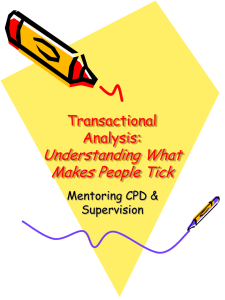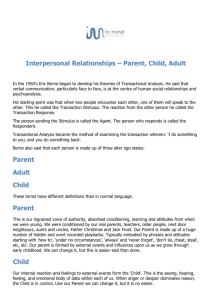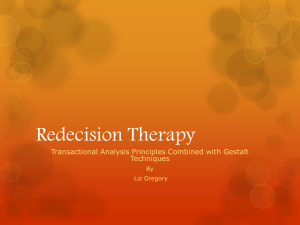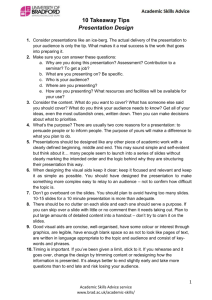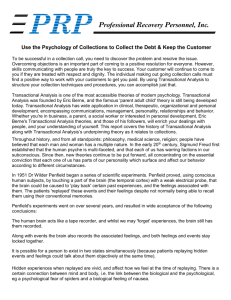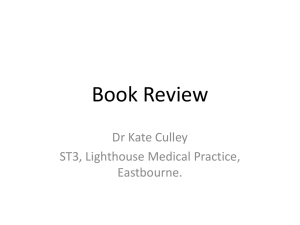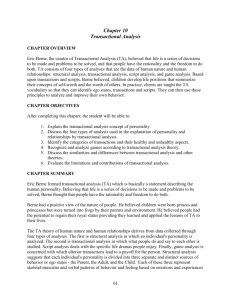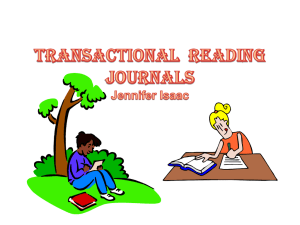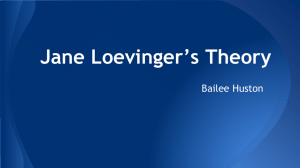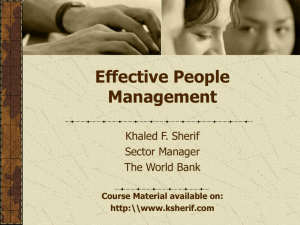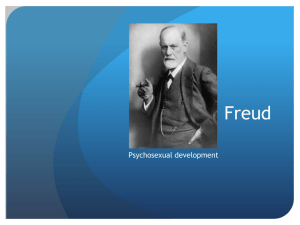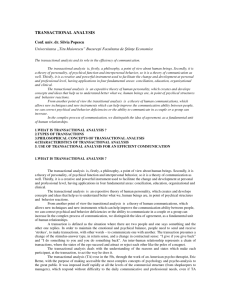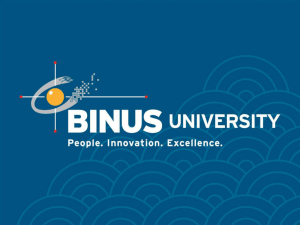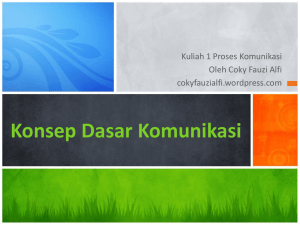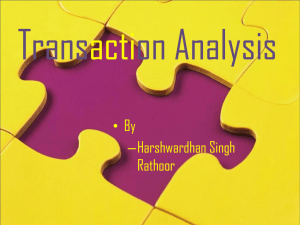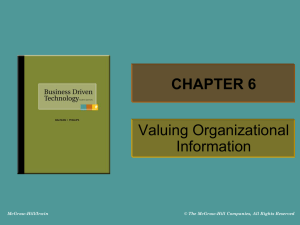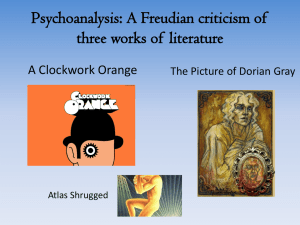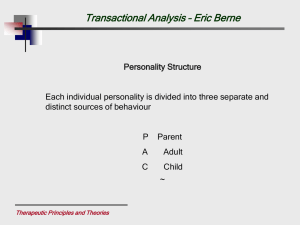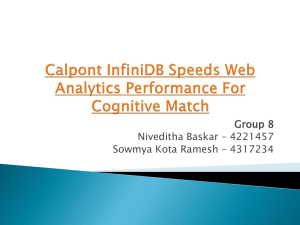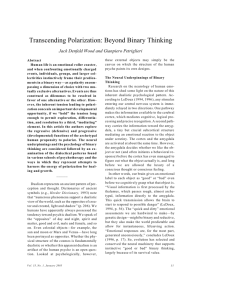Slide 1
advertisement
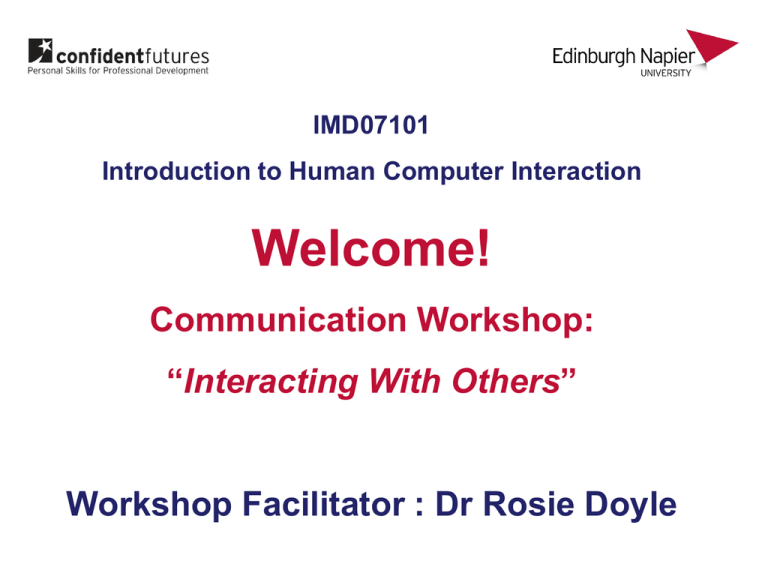
IMD07101 Introduction to Human Computer Interaction Welcome! Communication Workshop: “Interacting With Others” Workshop Facilitator : Dr Rosie Doyle General Learning Outcomes Understand communication as a dynamic / transactional process – and the implications of this perspective Learn a model to analyse the dynamic of communication ( Berne’s Transactional Analysis). Identify your personal communication style/s – general tendencies and in specific situations. Understand how communication dynamics affect your success in teamworking situations. Develop personal strategies to improve your communication skills, and develop your versatility. Contribution to the module: Communication in user-centred design Group assignment – constructive group work and reflective assessment Career and professional development – relevant personal skills: Teamworking Communication Self awareness and identity – strengths & areas for change PDP Do you ever find yourself? • Experiencing great difficulty in understanding some people • Being surprised at someone’s reaction to something you said or did • Experiencing same pattern of behaviour in specific relationships and • Feeling misunderstood or not heard • Thinking we said something we didn’t • Thinking we didn’t say something we did • Seeing things from our own perspective, rather than that of others • Not realising the effect, or outcome, of our words and behaviour on others Adler, H. (2002) Handbook of NLP Individual Activity In your workbooks, write down 2 examples of challenging 1:1 relationships (that you would be happy to share with others!) It may help to think of a time when: You felt frustrated? You felt de-motivated? Think about what the other person says or does? We will come back to this Communication Tool: TA - Transactional Analysis (TA) Eric Berne Berne E. “Games People Play “ 1964 Harris T “I'm OK You're OK” 1976 TRANSACTIONAL ANALYSIS Ego States P PARENT A ADULT C CHILD TRANSACTIONAL ANALYSIS: Ego States Nurturing P Critical A Free C Adapted Caring Nurturing Spoiling P Structuring Critical Controlling A Spontaneous Free Immature C Co-operative Adapted Resistant Taught/Ought Thought Felt P Responsibility for others A Responsibility for self C No sense of responsibility How People can relate? The EGO States for Transactional Analysis Parent Critical Nurturing Adult Critical, Disciplining, Restricting Helpful, Caring, Loving Concentrate on facts, not feelings, calm Independent of age – Mature and deliberating Impulsive, Instinctive, Undisciplined, Demanding Adapted Free Child Influence of Upbringing, “Does as it is told” – Guilt, Rebellion, Obedience and Compromises Taken from Eric Berne’s Original Transactional Analysis work Types of Words Used! Parent Critical “Don’t touch that”, “Leave it to me” Nurturing “Don’t be afraid”, “I’ll help you” Adult Adapted Free Child “What do you think?”, “What are the choices?” “Wow”, “Let’s Play”, “It’s mine” “I must because he says so”, “You always try to make me do that” Taken from Eric Berne’s Original Transactional Analysis work Parent, Adult or Child? Jonathan Ross Gordon Brown Anne Robinson James Bond Ant and Dec Nigella Lawson Group Activity • Rotate through three flipcharts and describe each ego state under the following headings CHILD • Words • Tone • Body Language PARENT ADULT Observing Group Behaviours …. 2 observers per group. Watch group activity and note any good examples of child/adult/parent interaction on the ‘observation sheet’. Rest of group – ignore observers! Your Challenge • Use the paper to make a “flying machine” • Winner is one that flies furthest • You have _5__ minutes! How does it work? •When we communicate we are doing so from one of our ego states •Our feelings at the time determine which one we use, and at any time something can trigger a shift from one state to another. •Effective transactions or communication is to and from the same ego state •Complementary transactions can be between opposite states •Ineffective communication can come from a cross over from ego state to ego state YOU OTHER P P Parent A A Adult C C Child P A C P A C P A C P A C P A C P A C Go back to your 2 challenging relationships … Choose the most problematic of these relationships In pairs, take it in turns to discuss the insights TA can offer you into the communication dynamic of this relationship Note any actions that may help you improve the communication dynamic of the relationship (i.e. changes to your words/tone/body language) Group Activity 1. You get some critical peer feedback on your project proposal 2. You get some critical feedback from your tutor on your project proposal 3. Someone pushes in in front of you in a queue 4. Someone interrupts you whilst you are speaking 5. Your friend asks you to come out to the pub on the night before you present a group project For your group’s scenario: • Write down examples of Parent, Adult and Child responses. • How would you respond? • Is it Parent, Adult, Child? How To Maintain Adult to Adult Communication • • • • • • • • Ask open questions Ask specific questions Showing understanding of others feelings Ask for a clearer explanation Listen attentively Admit it openly if you are mistaken Leave open the chance of other courses of action Check the facts • Use the caring parent • Combine the 3 ego’s where appropriate What next .....? What have you learnt and how can you use it? 1. Complete the ‘Desired Personal Outcomes’ sheet – Booklet p17 2. Complete the TA personal profile questionnaire (Booklet p 6) Thank you! Please take a minute to complete our short feedback form. We value honest (ADULT!) feedback!
